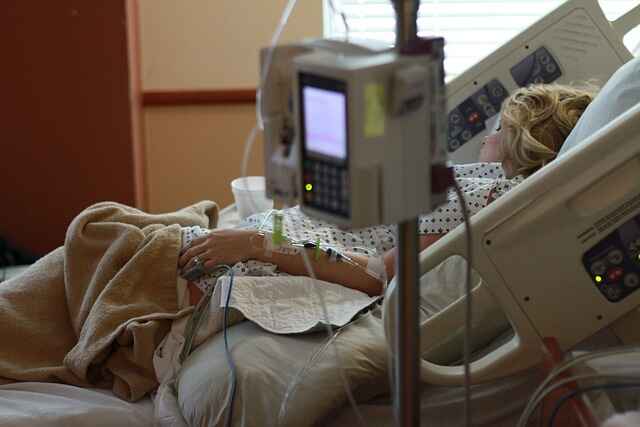Common Digestive Disorders – Part 2 from 13 to 24. For 1 to 12, check part 1
13. Gastroenteritis
Gastroenteritis is a gastrointestinal tract inflammation that includes the stomach and intestines. Although it is not caused by the influenza virus, it is usually referred to as the stomach flu or stomach bug. Gastroenteritis can be caused by infectious agents such as viruses, bacteria, and parasites, as well as non-infectious causes such as certain drugs, toxins, or food intolerances.
Gastroenteritis is very contagious and can be spread by direct contact with infected people, consuming contaminated food or water, or coming into contact with contaminated surfaces. Source
14. Gluten sensitivity
Gluten sensitivity, also known as non-celiac gluten sensitivity (NCGS), is a disorder in which people have unfavorable reactions to gluten-containing foods that are comparable to celiac disease symptoms. Gluten sensitivity, unlike celiac disease, does not entail the immune system attacking the small intestine or causing damage to the intestinal lining.
Gluten sensitivity symptoms can vary greatly in individuals and may include gastrointestinal symptoms such as bloating, gas, diarrhea, and abdominal discomfort. Non-gastrointestinal symptoms such as weariness, headaches, joint discomfort, skin rashes, and mood disturbances may also occur. Source
15. H-pylori
“H. pylori,” which stands for Helicobacter pylori. The bacteria H. pylori can infect the stomach lining and the upper section of the small intestine. It is one of the most frequent bacterial infections in the globe and is a primary cause of a variety of gastrointestinal problems.
Usually, a breath test, blood test, stool test, or endoscopy with a biopsy of the stomach lining is used to diagnose H. pylori infection. Blood testing can find antibodies to H. pylori, whereas breath tests and stool tests can find particular substances generated by the bacterium. Source
16. Hemorrhoids
Hemorrhoids, also known as piles, are enlarged and irritated blood vessels in the rectum and anus. They might be internal (found within the rectum) or external (found around the anus). Hemorrhoids are a common and frequently painful ailment, but they are rarely serious or life-threatening.
Hemorrhoids can be caused by increased pressure in the rectum and anus veins. Factors that contribute to this elevated pressure include intestinal straining, recurrent constipation or diarrhea, extended sitting, obesity, pregnancy, and age. Source

17. IBS
Irritable Bowel Syndrome (IBS) is a common gastrointestinal condition affecting the colon. It is a functional disorder, which means that it does not cause structural damage to the digestive tract but instead causes bowel changes and abdominal discomfort.
IBS is a chronic disorder, and its symptoms may appear and disappear over time. Certain circumstances might cause or worsen IBS symptoms in people who are prone to them. Certain foods (e.g., fatty or spicy foods, dairy products, caffeine), stress, hormonal changes, and changes in habit or lifestyle are common triggers. Source
Also, Read All About Chordoma Tumor: Types, Symptoms, Causes, Prevention
18. Lactose intolerance
Lactose intolerance is a digestive condition characterized by the body’s inability to digest lactose, a sugar present in milk and dairy products. This is due to a lack of lactase, the enzyme responsible for breaking down lactose into simpler sugars that the body can absorb. People of Asian, African, and Native American heritage are more likely to have it, while people of European descent are less likely to have it.
The main strategy for treating lactose intolerance is to limit or stop eating foods that contain lactose. Milk, cheese, yogurt, ice cream, and several processed foods are common sources of lactose. Dairy products that are lactose-free or lactose-reduced as well as plant-based alternatives (such as almond milk and soy milk) can be used as a replacement. Source
Also, Read Health Benefits Of Cheese: Nutrition, Healthy Facts & Warnings
19. Leaky gut
The term “leaky gut” refers to a condition known as excessive intestinal permeability. It is a condition in which the lining of the intestines becomes more porous, allowing toxins, undigested food particles, and germs to slip through the intestinal wall and enter circulation. This phenomenon is not accepted as a diagnosis of illness in standard medicine, although it has acquired popularity in some alternative health communities. Source
20. Pancreatitis
Pancreatitis is an inflammatory illness that affects the pancreas, an organ found behind the stomach. The pancreas has two major functions: it generates digestive enzymes which help in the breakdown of food in the small intestine and it produces hormones such as insulin that regulate blood sugar levels. Acute pancreatitis (sudden and short-term) or chronic pancreatitis (long-term and recurring).
Gallstones, which can obstruct the pancreatic duct, and excessive alcohol use are the most typical causes of pancreatitis. Other potential causes include high blood triglyceride levels, some drugs, infections, pancreas damage or injury, and certain medical disorders. Source

21. Parasites
Parasites are organisms that live in or on another organism, known as the host, and rely on the host for sustenance and protection. They can be found in a variety of settings, such as soil, water, and living beings such as humans and animals. Depending on the parasite and the location of the body affected, parasites can cause a variety of diseases and health problems.
Protozoa (single-celled organisms), helminths (worms), and ectoparasites (parasites that live on the host’s skin or outer surfaces) are the three major types of parasites. Giardia (a protozoan parasite), roundworms, tapeworms, and lice are all common human parasites. Source
22. SIBO
SIBO is for Small Intestinal Bacterial Overgrowth. It is a disorder in which bacteria develop excessively in the small intestine. Normally, the small intestine has a lower amount of microorganisms than the large intestine. However, in SIBO, the bacterial equilibrium is upset, and there is an overgrowth of bacteria in the small intestine, which can cause a variety of digestive problems and nutrient loss.
The use of antibiotics to minimize bacterial overgrowth is the mainstay of SIBO treatment. Because of its limited absorption and confined impact in the small intestine, rifaximin is one of the most widely provided antibiotics for SIBO. To control symptoms and enhance gut health, dietary adjustments, and nutritional supplementation may be recommended. Source
23. Stomach Cancer
Stomach cancer, also known as gastric cancer, is a type of malignant tumor that originates in the stomach lining. It is a somewhat prevalent cancer around the world, but its prevalence has been declining in many parts of the world due to advances in detection and lifestyle changes.
Symptoms of stomach cancer may be nonexistent in the early stages. Common signs of severe cancer include chronic and unexplained stomach pain or discomfort, unexpected weight loss, loss of appetite, difficulty swallowing, nausea, vomiting, and blood in the stool. Source

24. Ulcerative colitis
Ulcerative colitis (UC) is a chronic inflammatory bowel disease (IBD) of the colon (large intestine) and rectum. It is distinguished by inflammation and the formation of ulcers in the inner lining of the colon, resulting in a variety of gastrointestinal symptoms and associated consequences.
Ulcerative colitis is a chronic inflammatory disease that causes the lining of the colon to become red, bloated, and ulcerated. The inflammation usually begins in the rectum and can migrate to other parts of the colon. Source
These are the common digestive problems found in human body. Although these health issue may appear benign and not so troublesome, a careful inspection from a specialist is a must.





